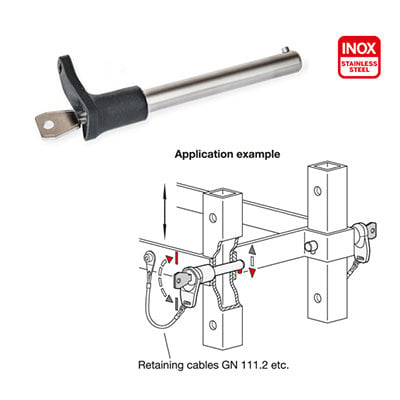www.industry-asia-pacific.com
09
'20
Written on Modified on
LOCKING PINS SECURED WITH A KEY
Locking pins quickly and reliably connect and secure various components. For greater security against accidental release or manipulation, Elesa+Ganter has developed new lockable stainless steel locking pins GN 314.

Even if pins appear simple at first glance, Elesa+Ganter has consistently demonstrated that this type of standard part can still be improved on in plenty of ways. For instance, the recently introduced variants GN 113.11 and GN 113.12 are ideal for narrow spaces thanks to the L-handle on one side. As usual, the two balls in the pin are unlocked by pressing the button in the handle. The most recently added member of the locking pin family, type GN 314, dispenses with this button. It retains the single-piece handle and integrates an extremely valuable feature for certain applications: It can be securely locked.
This function is especially important in safety-related applications since the lock prevents alterations to temporary or permanent installations.
Platforms, stands, projection walls at drive-in cinemas, speaker towers and even production systems can be secured against manipulation with these lockable locking pins. Thanks to the variety of available dimensions (with pin diameters from 8 to 20 mm and lengths to 120 mm), GN 314 is suitable for almost any application that was previously difficult to secure. As always, Elesa+Ganter can also produce other dimensions to customer specifications.
The operation is easy to explain: Turning the key 180 degrees rotates a shaft, which turns a cam in the tip of the pin. This presses a pawl laterally out of the pin. Pulling out the key fixes the pawl in place and prevents unauthorized removal of the locking pin. Every pin is delivered with two keys.
Lock type SC allows all locking pins to be operated with the same key, while lock type SU requires a different key for each pin. In this way, groups with the same lock type can be used within a larger application featuring different lock types.
The new locking pin also offers high security with regard to its load carrying capacity. Elesa+Ganter determined the double shearing resistance in accordance with DIN 50141. In the test setup, the pin connects an element to another that encompasses it. The force that results in a break in both shear planes is then measured. For a locking pin with 10 mm diameter, the shearing resistance is 46 kN, while a 20mm pin can withstand 227 kN.
www.elesa-ganter.com

